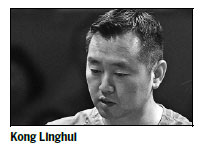Even before the final serve in Tuesday's women's table tennis team final, China head coach Kong Linghui was thinking about the 2020 Tokyo Games.
"While Li Xiaoxia and I were watching the third doubles game on the side court, we talked about what the situation would be in four years," said Kong, who guided China to yet another gold medal.
"It definitely won't be this easy. I mean, Germany is a great team and Japan could be a much tougher opponent when Tokyo hosts the Games."
With a quick 3-0 win over Germany on Tuesday evening, the all-time leading Chinese squad secured its third of the four table tennis golds up for grabs in Rio. It marked the 27th overall for Team China since the sport's introduction at the 1988 Seoul Games.
Germany, an unexpected finalist after outlasting 2012 London runner-up Japan in five games on Monday, won just one of 10 sets against China en route to winning the nation's first medal for women players.
With two Grand Slam winners in Li Xiaoxia and Ding Ning plus current world No 1 Liu Shiwen on his roster, Kong, a Grand Slam winner 16 years ago, has a loaded lineup. But he's pondering how it might be shuffled before Tokyo.
"In four years, Ding Ning will turn 30 years old and Liu Shiwen will be 29. Li Xiaoxia, now 28, could be as competitive at that time as she is right now, but no one can guarantee that. We'll probably have to play the next Olympics with new blood," Kong said.
"We are never going to fear change, since China always prepares for the next generation of table tennis. But it will make the task of defending all four titles even tougher."
When Kong took the helm of the women's team nearly four years ago, key players Li and Ding had already proven themselves under former coach Shi Zhihao.
"We achieved here another gold sweep in style, conceding only three sets all together through singles and team events. It's a result coming from the efforts of all China's coaches and players over the past decades," Kong said.
"Things will turn harder for us, however, when we form a new team, while Japan's current squad is coming of age for the Tokyo Games.
"First of all, we'll keep working hard and logically as we did before. Then we'll try to prolong the competitive lives of the core players of this current squad, like Li and Ding, while giving the youngsters more opportunities to play on the international stage.
"It won't be easy ... but it will be interesting and exciting work, especially with an opponent as strong as the Japanese. Athletes always want to win against the strongest."

(China Daily 08/18/2016 page4)